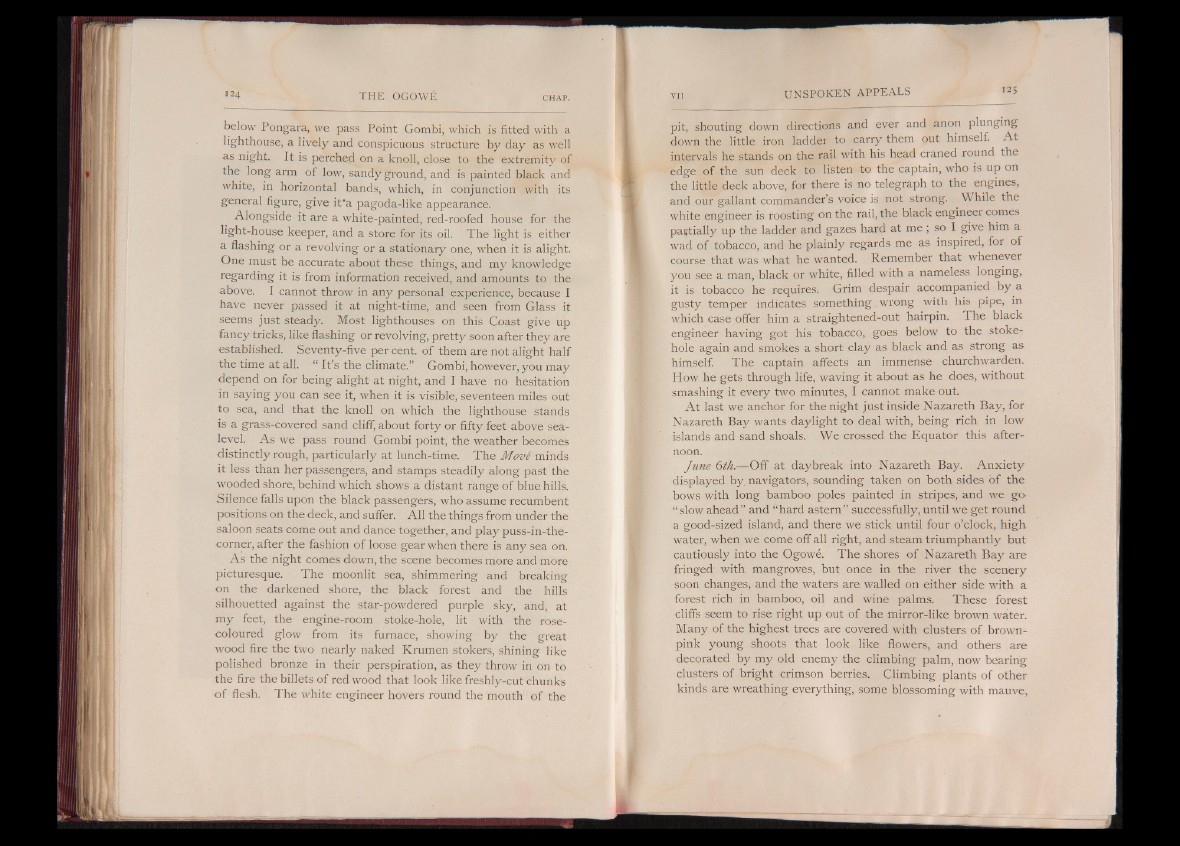
below Pongara, we pass Point Gombi, which is fitted with a
lighthouse, a lively and conspicuous structure by day as well
as night. It is perched on a knoll, close to the extremity of
the long arm of low, sandy ground, and is painted black and
white, in horizontal bands, which, in conjunction with its
general figure, give it*a pagoda-like appearance.
Alongside it are a white-painted, red-roofed house for the
light-house keeper, and a store for its oil. The light is either
a flashing or a revolving or a stationary one, when it is alight.
One must be accurate about these things, and my knowledge
regarding it is from information received, and amounts to the
above. I cannot throw in any personal experience, because I
have never passed it at night-time, and seen from Glass it
seems just steady. Most lighthouses on this Coast give up
fancy tricks, like flashing or revolving, pretty soon after they are
established. Seventy-five per cent, of them are not alight half
the time at all. “ It’s the climate.” Gombi, however, you may
depend on for being alight at night, and I have no hesitation
in saying you can see it, when it is visible, seventeen miles out
to sea, and that the knoll on which the lighthouse stands
is a grass-covered sand cliff, about forty or fifty feet above sea-
level. As we pass round Gombi point, the weather becomes
distinctly rough, particularly at lunch-time. The Movi minds
it less than her passengers, and stamps steadily along past the
wooded shore, behind which shows a distant range of blue hills.
Silence falls upon the black passengers, who assume recumbent
positions on the deck, and suffer. All the things from under the
saloon seats come out and dance together, and play puss-in-the-
corner, after the fashion of loose gear when there is any sea on.
As the night Comes down, the scene becomes more and more
picturesque. The moonlit sea, shimmering and breaking
on the darkened shore, the black forest and the hills
silhouetted against the star-powdered purple sky, and, at
my feet, the engine-room stoke-hole, lit with the rose-
coloured glow from its furnace, showing by the great
wood fire the two nearly naked Krumen stokers, shining like
polished bronze in their perspiration, as they throw in on to
the fire the billets of red wood that look like freshly-cut chunks
o f flesh. The white engineer hovers round the mouth of the
pit, shouting down directions and ever and anon plunging
down the little iron ladder to carry them out himself. A t
intervals he stands on the rail with his head craned round the
edge of the sun deck to listen to the captain, who is up on
the little deck above, for there is no telegraph to the engines,
and our gallant commander’s voice is not strong. While the
white engineer is roosting on the rail, the black engineer comes
pastially up the ladder and gazes hard at m e ; so I give him a
wad of tobacco, and he plainly regards me as inspired, for of
course that was what he wanted. Remember that whenever
you see a man, black or white, filled with a nameless longing,
it is tobacco he requires. Grim despair accompanied by a
gusty temper indicates something. wrong with his pipe, in
which case offer him a straightened-out hairpin. The black
engineer having got his tobacco, goes below to the stokehole
again and smokes a short clay as black and as strong as
himself. The captain affects an immense churchwarden.
How he gets through life, waving it about as he does, without
smashing it every two minutes, I cannot make out.
At last we anchor for the night just inside Nazareth Bay, for
Nazareth Bay wants daylight to deal with, being rich in low
islands and sand shoals. We crossed the Equator this afternoon.
June 6tk.— Off at daybreak into Nazareth Bay. Anxiety
displayed by. navigators, sounding taken on both sides of the
bows with long bamboo poles painted in Stripes, and we go-
“ slow ahead” and “hard astern” successfully, until we get round
a good-sized island, and there we stick until four o’clock, high
water, when we come off all right, and steam triumphantly but
cautiously into the Ogowe. The shores of Nazareth Bay are
fringed' with mangroves, but once in the river the scenery
soon changes, and .the waters are walled on either side with a
forest rich in bamboo, oil and wine palms. These forest
cliffs seem to rise right up out of the mirror-like brown water.
Many of the highest trees are covered with clusters of brown-
pink young shoots that look, like flowers, and others are
decorated by my old enemy the climbing palm, now bearing
clusters of bright crimson berries. Climbing plants of other
kinds are wreathing everything, some blossoming with mauve,